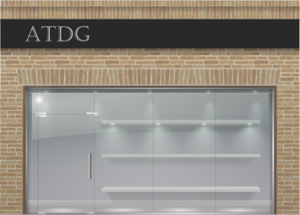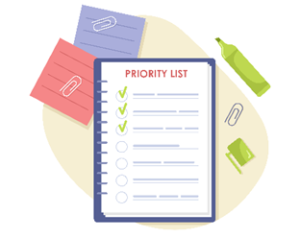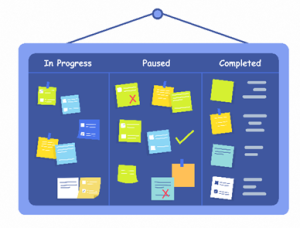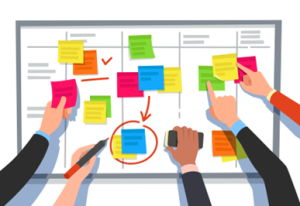
Darla had just arrived at her favourite café when someone tapped her on the shoulder. Turning around, she saw a face that she hadn’t seen since university.
“Paul! This is a surprise! It’s been… wow, it’s been nearly 10 years since I saw you last! How have you been?”
Darla had been in many of the same classes as Paul, and they had ended up working together on a lot of their coursework. Sometimes, Paul was helping Darla, sometimes it had been the other way around, but they had always made an excellent team.
Paul was grinning ear to ear. “I saw that old satchel, and I thought to myself, Who do I know that carries a relic like that around? Why, it must be Darla! I’ve been pretty good, actually. I just got a job with ATDG Limited – I’m their new operations manager.”

“Impressive,” Darla nodded. “Let me just get my coffee, then tell me all about it.”
Once she had her usual oat milk latte, Darla made her way over to the table Paul was sitting at. Paul shifted some papers to one side as she sat down, and Darla saw what looked like task lists.
“So, what’s it like at ATDG?” Paul smiled. “It’s good. I’ve only been there a few weeks, but the operations team are all good people. Some of the other managers aren’t all they could be…” Paul’s smile faded a little. “… but they’re probably doing their best.”
Darla raised an eyebrow quizzically. “You’ve only been there a few weeks, and you’re already feeling something is a bit off? I’ve got to be honest, Paul, this doesn’t sound as wonderful as I’d hoped. What’s going on?” Paul shrugged, clearly feeling uncomfortable.

“Oh, it’s nothing, really. It’s just… the ops team isn’t performing as well as they probably could. I haven’t asked, but I get the feeling the last ops manager was let go because he couldn’t turn them around. And some of the other managers have been saying things that make me think they don’t expect me to last long either. It’s a bit discouraging, you know? Especially since I’ve only just started there. I mean hey, give me a chance to make my own mistakes instead of the ones I inherited!”

Paul had always tended to try to defuse and deflect things by making jokes, but Darla was a bit concerned about her old friend. She frowned at the man sitting across the table from her.
“This actually sounds kind of serious, Paul. It sounds like your colleagues don’t have confidence in you, and if they don’t have confidence in you, they might not support you if you try to change anything. What’s going on with the ops team?”
Paul shifted uneasily in his seat. “Oh… it’s probably just because I’m new there, y’know? It just… it seems to take all my time trying to keep track of what’s going on in operations, and even then, half the time it turns out that the information I get doesn’t match what’s happening. I have to make assumptions about what’s happening, or going to happen, based on all these lists.” Paul gestured at the papers at the side of the table.

“Hmmm.” Darla considered the situation. “You’ve tried delegating stuff to the supervisors, I imagine?”
“Yep. It’s not really practical, they don’t have the overview that would let them act in an informed way. It’s not their fault, of course, more the way things are running… or not running.”
“So how do things run?”
“Well, we start by giving the guys out in the factory priority lists, so they can get on with something even if a supervisor isn’t there to tell them what to do,” Paul explained.
“That makes sense,” Darla nodded. “Are you saying it doesn’t work?”
“Eh…” Paul sighed. “It kind of works, for a while… but we’re trying to keep the lists short, y’know?”

“Something they can refer to if they get stuck, not a huge, big poster beside each machine. So of course they run into things the guy who made the list – me or one of the supervisors – didn’t predict, so there are no instructions about it. When that happens, they have to put that job to the side and carry on with something else. Maybe there’s a problem with that job too, so they put that one aside as well. They end up processing jobs out of sequence, which doesn’t match the priority lists, which means that far too often we don’t actually know what’s being worked on or when a job will finish. It’s really embarrassing to have to say that to the other managers, let me tell you!”

“Ouch!” Darla winced. “Yeah, that’s not going to help their confidence levels. What have you tried to deal with that?”
Paul leaned back in his chair glumly. “The obvious thing was to do without the lists and have me or the supervisors personally assign the next job to each person.”
Darla shook her head sympathetically. “That’s a lot of running around.”
“It is, and it didn’t even help!” Paul leaned forward again, with short, sharp gestures showing his frustration. “Because if we assign everything personally, the machine operators might know what to do now, but they don’t know what’s coming up next, do they? So if anything unexpected happens, they need a supervisor to get things going again, and when they get to the end of a job they just stop and wait for the supervisor to come around and tell them what to do next. And again, it’s not their fault, because that’s exactly what we’ve told them to do! But we end up with output dropping like it’s gone over a cliff, and it’s not much fun reporting that to the other managers, either! Not when they can see people standing idle out in the factory!”

“No, I don’t imagine it is…” Darla’s voice trailed off as she thought. It sounded like Paul was pretty stuck. Either option left him and the operations department looking bad, and if he didn’t improve matters fast, he was going to have a miserable time for as long as he lasted in his role as operations manager… which might not be long.

Darla sighed and shook her head. “Sorry, Paul, I don’t have any brilliant ideas. I’m not an ops girl, and I don’t even hang around with the ops manager where I work. All I can tell you is how they do things in our factory. That seems to work OK – at least, they don’t have the problems you’re talking about – but you’d have to see whether it would work for you.”
“Darla, at this point I would seriously consider ideas from a raccoon who claimed to be an architect, if it had anything that worked in an operations context somewhere! How do they manage things where you are?”

Darla shrugged. “They have a big visual board at one side of the factory floor. When a job is released, it gets placed on the board at the bottom, and it moves up the board as time goes by. I think the board has on it the next week or so of work, but don’t quote me on that. Like I said, I’m not an ops girl.”
“Interesting…” Paul pursed his lips and looked thoughtful. “So… how does this help, exactly?”
“Well, from what I can see, the supervisors just have to keep the visual board up to date. If a job gets cancelled or a priority changes, they rearrange what’s on the board, and as jobs change status – you know, in progress, paused, completed – that gets indicated too. The people out in the factory look at the board to know what they should be doing next. As for the effects… well, everyone seems to know what they should be doing, the supervisors don’t have to run around telling everyone what to do next, and it’s an accurate picture of the state of the jobs as they progress through the factory. It seems like a good way of doing things, I’m honestly a bit surprised you don’t have anything like it where you are.”

Paul shook his head. “We don’t, but I’m going to try to set up something like that when I get back. It can’t be any worse than what we have now, and at least it’s something new to try. And if it actually works… well, that might help me turn things around in the operations team!”
“Sounds good,” Darla agreed. “Let me know how it goes. And maybe we can catch up again sometime, when some of the chaos at work has died down a bit.”
Paul nodded and smiled as he stood and started collecting his papers. “I will. We’ve got nearly 10 years to catch up on, hopefully we won’t always have to talk about work!”
Darla’s work increased significantly in the following week, and it was almost a month before she managed to arrange another meeting with Paul. When she finally made it to the coffee shop, she found that he had already ordered coffee for her.
“An oat milk latte. That’s what you were having last time, wasn’t it?”
“That’s right,” Darla smiled. “Thanks. With this, I might just survive until the afternoon. How are things going for you?”

Paul was looking a lot more relaxed than the last time they met, and he shot Darla a grateful glance. “A lot better than they were. I’ve got you to thank for it too, because you got me thinking about visual boards.”
Darla took a sip of her coffee. “They made a difference, then?”
“Oh yeah, it’s huge! Like the difference between night and day; there’s just no comparison. It’s so much easier to see what people are working on and how far along it is, and if things get rescheduled there’s no drama because it’s all up there on the wall. We don’t need to make assumptions about what jobs are where, either. When they finish a job the machine operators just look for the next one on the board, and if they can’t make progress, they indicate that on the ticket – all the supervisors have to do is keep the visual board up to date. It’s amazing, you should see it… ah, but if you want to see it you can just go down to the factory where you work, can’t you? Either way, Darla, I owe you a lot for putting me on to this idea.”

“And how are the other managers responding?”
Paul laughed. “Again, it’s like night and day. It was like they didn’t see much point in being friendly before because they thought I’d be gone soon, but now they seem to realise I’m one of the good guys. They support me on pretty much everything, these days. The sales manager was talking about setting up a visual board in their office the other day, which probably tells you everything you need to know!”

“Good. I’m glad to hear those visual boards have helped you get control of things in operations. It sounds like they make a big difference in terms of visibility.”
“They do,” Paul nodded. “I’ve even had a couple of supervisors say that they can tell what the situation will be tomorrow by looking at the pattern of jobs on the board. If they really can, that’ll be a big help too.”
Darla smiled and raised her coffee cup in a salute. “Excellent. A toast to the success of visual boards, then! Now…” She leaned forward. “Would you mind going into detail about how you implemented them? Because if they worked for you, they might work for me, and it’d be nice to have a bit less chaos to deal with in my content team…”
